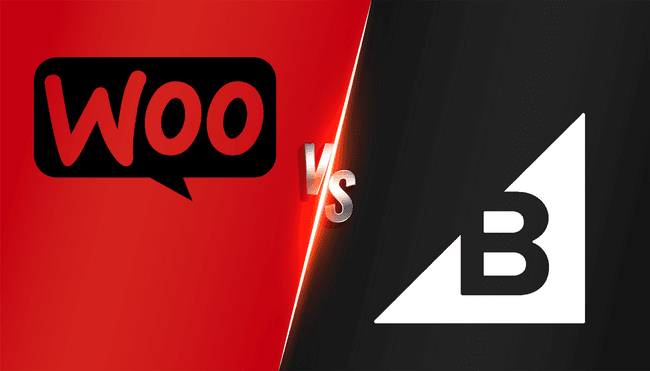

Success for an online store depends very much on the right eCommerce platform. Two leading eCommerce platforms include WooCommerce and BigCommerce. They both provide unique features, adaptability, and room to grow meeting various business requirements. But how can you figure out which platform suits you best?
This blog will take a close look at the main differences strong points, and possible drawbacks of both platforms. If you run a small business and want a simple fix, or you’re a big company looking to customize everything comparing WooCommerce vs BigCommerce will help you choose. Let’s check out WooCommerce vs BigCommerce to see which one matches your aims, budget, and tech skills better.
Overview of WooCommerce vs BigCommerce
WooCommerce Overview
WooCommerce is one of the most powerful eCommerce plugins, running extremely flexible powerhouses on WordPress sites, and allows the owner of a WordPress website easily to turn his WordPress sites into full-fledged e-commerce stores. Known for their great customization options and plentitude of extensions, WooCommerce gives tailored eCommerce experiences to businesses and companies of all sizes and types.
Advantages of WooCommerce:
- Cost-Effective: WooCommerce is free to use, though paid themes and extensions can be used to enhance functionality.
- Flexibility: Provides the availability of numerous plugins and extensions that can add specific features to businesses.
- Integration: It easily integrates with WordPress, hence coming with a very powerful content management system.
- Community Support: A huge, living community offers far-reaching support, tutorials, and forums.
- Scalability: It can accommodate small-scale to large-scale operations, usually catering to the needs of expanding businesses.
Disadvantages of WooCommerce:
- Hosting Costs: WooCommerce will serve as an e-commerce platform but, at the same time, it will not be acting as your hosting provider. Being self-hosted, that is, users have had to maintain their hosting provider increases the cost and complicates matters.
- Maintenance: It should undertake periodic updates and maintenance for maximum performance and security.
BigCommerce Overview
BigCommerce is a solid, fully-hosted e-commerce platform focused on streamlining the sales process in a web environment. It covers a broad range of business types-from small businesses to large businesses-by offering hundreds of inherent features and integrations that augment the development and management of online retail channels.
Advantages of BigCommerce:
- Ease of Use: It’s beginner-friendly with a simple drag-and-drop interface.
- Built-In Features: provides users with natively available wide-ranging SEO, marketing, and analytics analysis tools, hence making additional add-ons redundant.
- Scalability: Built to scale with business, with high performance and scalability.
- Security: Strong security features that are constantly updated and comply with recommended industry standards.
- Support: They ensure accessibility to 24/7 customer support services for customers.
Disadvantages of BigCommerce:
- Pricing: Subscription-based models are cost-prohibitive, especially for smaller businesses or start-ups.
- Customization: Limited compared to WooCommerce, with fewer options for deep customization.
- Add-Ons: Availability is limited, which could limit the functionality in niche requirements.
- Hosting: BigCommerce will also act as your hosting provider but minimum authority to control the configurations of the servers and the performances.
WooCommerce and BigCommerce have their pros and cons. The decision depends on your intent, budget, and personal skills.
A quick comparison of WooCommerce and BigCommerce
| Sr. No. | Criteria | WooCommerce | BigCommerce |
|---|---|---|---|
| 1 | Starts at $0 (free plugin), with additional costs for extensions and themes | Starts at $29.95/month for standard plan, higher for enterprise plans | |
| 2 | User-friendly with a learning curve, especially for WordPress beginners | Very beginner-friendly with drag-and-drop interface | |
| 3 | Extensive features with numerous plugins and integrations | Comprehensive built-in features, but less flexible than WooCommerce | |
| 4 | Massive library of free and paid plugins | Limited number of add-ons compared to WooCommerce | |
| 5 | Highly scalable with numerous extensions and customization options | Scalable but with higher costs for larger operations | |
| 6 | Supports a wide range of payment gateways | Supports multiple payment gateways, but fewer options than WooCommerce | |
| 7 | Wide variety of themes and customization options | Good selection of themes, but less customizable than WooCommerce | |
| 8 | Highly customizable with extensive plugin support | Customizable but with more limitations compared to WooCommerce | |
| 9 | Excellent inventory management with various plugins | Good inventory management, but less flexible than WooCommerce | |
| 10 | Strong marketing and SEO tools with numerous plugins | Good marketing and SEO tools, but fewer options than WooCommerce | |
| 11 | High security with regular updates and a large community for support | Secure with regular updates, but less community support than WooCommerce | |
| 12 | Extensive community support and numerous tutorials | Reliable support, but not as extensive as WooCommerce's community |
Pricing
Pricing is an important factor when picking an eCommerce platform. Besides the setup you’ll also need to consider costs like hosting provider, add-ons, and transaction fees.

WooCommerce: It’s free to use as a WordPress plugin. This makes it great for a tight budget. However, you’ll need to pay for hosting, themes, and extensions. The good thing is you can control your spending and increase it as your business grows.
BigCommerce: This platform has a monthly subscription, starting at $29.95, which makes costs easier to predict. Such a fee includes hosting provider and all the features that come automatically with the service, and the price can be greatly expanded when one moves to a higher end package. The benefit here is that one gets a known amount of money spent with access to extensive support and security.
In comparison of WooCommerce vs BigCommerce, WooCommerce is more flexible and possibly cheaper, especially if you are comfortable managing your hosting provider and add-ons. BigCommerce provides an all-in-one package but at a much higher cost.
Ease of Use
The ease of usability is very important because it determines the speed one can have to set up and run a store. A user-friendly platform shall easily curb several problems.

WooCommerce: Flexibility is high on the count, but the problem here lies with users who are new to WordPress, as this one may seem a little cumbersome. With the preliminary barriers of learning overcome, a person can truly use all that WordPress offers-in terms of rich functionality and customization options.
BigCommerce: BigCommerce is designed to make user access much easier. This e-commerce platform, combined with the use of the drag-and-drop interface together with structured onboarding procedures, results in a rapid start for first-time users. Another important consideration is that the online selling solution takes care of most technical details to let users focus only on running their e-business most effectively.
In the comparison of WooCommerce vs BigCommerce regarding user-friendliness, BigCommerce is the better option for those who are new to e-commerce. However, WooCommerce requires a greater initial investment of effort but provides more flexibility once users get familiar with its functionality.
Features
An e-commerce platform features are a must in satisfying the particular needs of your business, right from product management to marketing tools.

WooCommerce: WooCommerce provides extensive functionalities through its core plugin and numerous extensions. Users can customize their stores according to specific needs, enabling them to integrate with different external services. WooCommerce is open source; you can modify almost anything to your needs.
BigCommerce: It does contain quite many integrations of marketing, SEO, and analytics out-of-the-box though compared to WooCommerce.
Considering WooCommerce vs BigCommerce on issues of opportunities of customization it provides; features, WooCommerce offers different possibilities and capabilities for extending it. Thereby, it stands a rather different extreme than an already robust preset of features possible through BigCommerce.
Add-ons
Add-ons and extensions boost functionality in an e-commerce platform, giving features and integrations that are the lifeblood for your enterprise.

WooCommerce: It also has a vast library of both free and paid add-ons. In this way, WooCommerce gives nearly limitless possibilities for customization. It supports payment gateways, advanced analytics, and shipping options. For custom features, consider hiring a WooCommerce developer to get exactly what you need.
BigCommerce: It provides a variety of apps and integrations to expand your store’s functionality. Still, the choice is much more limited than in the case of WooCommerce. They cover essential functions well, but you might find fewer options for highly specialized needs.
WooCommerce wins this comparison of Add-ons between WooCommerce vs BigCommerce. WooCommerce with its extensive range of add-ons provides more flexibility for customization. BigCommerce, while reliable, has fewer options.
Scalability
Scalability ensures your platforms grow with increased traffic and transactions as your business grows.

WooCommerce: Most people believe WooCommerce is not scalable. Well, WooCommerce can Scale as smoothly to Your Growing Stores with your hosting provider. This can be very easy. If managed resources, however, will really depend on setting it up. And only the proper setup will suffice. Thus, it can pass major traffic and large complicated catalogs but requires planning accordingly.
BigCommerce: This scalable-engineered e-commerce platform on BigCommerce provides enough performance and the infrastructure, which can readily support traffic and transactions during high-volume periods. Such a fully-hosted solution lets it manage the technical constituents, therefore making it work seamlessly.
When you compare BigCommerce vs WooCommerce for scalability, both are a good choice. is a straightforward choice for scalability, ideal for rapidly growing businesses. WooCommerce can scale effectively, but it requires more proactive management.
Trying to figure out the ideal e-commerce platform for your business?
Consult our Experts Now!Payment methods
Providing the option of pays will enhance the conversion rate and enrich the customer experience.

WooCommerce: Supports many payment gateways, like PayPal, Stripe, and more regional options. This flexibility lets you cater to a global audience with various payment preferences.
BigCommerce: BigCommerce also accepts various payment gateways, from popular ones such as PayPal, Stripe, and Amazon Pay. It offers fewer regional payment methods compared to WooCommerce. It will allow flexibility regarding payment and is more apt for a business that plans to target the international market.
WooCommerce offers more flexibility in payment methods, which makes it a better choice for businesses targeting a global market. Comparing BigCommerce with WooCommerce, BigCommerce provides solid options but with slightly less variety.
Themes
Themes determine the looks of your online store, as well as being critical in terms of user experience and brand identity.

WooCommerce: WooCommerce offers a wide range of free and paid themes most of which offer more space than enough for modification purposes. Since it integrates amicably with WordPress, its user can take advantage of a rich variety of choices available in the WordPress space.
BigCommerce: Provides a solid level of customization within the platform. However, this e-commerce platform is not the same as the flexibility of WooCommerce because certain aspects are more restricted within the hosted environment.
WooCommerce excels regarding theme variety and customization possibilities. BigCommerce has high-quality themes available but with fewer customization options.
Customizability
Customizability will help you to alter the design and functionality of your online shopping according to specific needs.

WooCommerce: WooCommerce is very customizable as it is an open source. Users can change virtually every point of their online store by using thousands of plugins and themes, meeting diverse needs. Also, in case some specific functionality is required from a theme or plugin, support from WooCommerce development services is available too.
BigCommerce: BigCommerce offers a good level of customization within its platform. However, this e-commerce platform is not the same as the flexibility of WooCommerce because certain aspects are more restricted within the hosted environment.
WooCommerce provides superior customizability. This makes WooCommerce ideal for businesses with specific or complex needs. BigCommerce offers ease of use with moderate customization options.
Inventory Management
Good inventory management keeps operations smooth by maintaining stock levels and timely order fulfillment.

WooCommerce: Has strong inventory management that can be enhanced with plugins. Users can track stock levels, monitor backorders, and even set up notifications for low stock.
BigCommerce: BigCommerce has some pretty robust in-built inventory management features. Namely real-time tracking and automated updating. Though pretty comprehensive, probably not as customizable as WooCommerce plugins in more precise ways.
When comparing BigCommerce vs WooCommerce for inventory management, both platforms excel in this area. But, WooCommerce is slightly more flexible and advanced through its plugins. BigCommerce provides a reliable and straightforward solution but with fewer advanced features.
Marketing & SEO
Marketing and SEO functionalities are highly essential to drive traffic and conversion towards your online store.

WooCommerce: It takes advantages of WordPress powerful SEO capabilities and offers loads of marketing plugins such as SEO tools and email marketing integrations. It provides the most effective methods to market your store.
BigCommerce: BigCommerce integrates built-in SEO tools along with marketing features, such as automated email campaigns and even discount codes. The tools here work pretty well but aren’t as customizable as WooCommerce is.
The upper hand for WooCommerce will be that of overall marketing and SEO capabilities through WordPress add-ons.
Security
Security is one of the key factors for eCommerce because it guards the data of customers and provides safety in transactions.

WooCommerce: Users have to manage their own security, such as SSL certificates and updates. It can be very secure with proper precautions, but it does require active management.
BigCommerce: This platform manages security for you, and it offers built-in features such as SSL certificates, PCI compliance, and regular updates. It makes things a lot easier for the store owner.
BigCommerce provides a simple, out-of-the-box security solution. In contrast, WooCommerce will demand proactive management for the same degree of security.
Support
Reliable support is essential to quickly solve problems and run your store well.

WooCommerce: It has an immense community with forums, tutorials, and documentation. Most support comes from the community and third-party developers, although official support is available.
BigCommerce: Provides support 24/7 through phone, email, and live chat. Therefore, users can get their queries solved at any time.
BigCommerce stands out with professional, always-available support. WooCommerce is more reliant on community support, which is very extensive but not as immediate as that of BigCommerce.
Building a successful online learning business often relies on creating compelling membership perks to keep students engaged and subscriptions rolling in.
Conclusion
Your choice between BigCommerce vs WooCommerce would depend on your requirements, technical know-how, and budget in choosing BigCommerce and WooCommerce.
If you already know WordPress and prefer customization, then WooCommerce would be your best bet. It’s also pretty inexpensive and highly adaptable to a business of small to medium sizes.
BigCommerce offers a comprehensive solution with features built in, security, and around-the-clock support. It is ideal for business setups that are simple and scalable without having to be worried about technical complexity.
To sum it all up, WooCommerce is perfect for the one who wants flexibility with customization, while BigCommerce suits the one who needs an all-in-one solution, easy to use.





